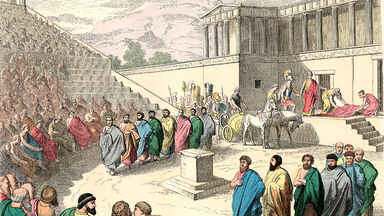There was no seat, and generally only room for the combatant and his charioteer to stand in.
An immense number of inscriptions have been found in the excavations, and many works of art, including a bronze charioteer, which is one of the most admirable statues preserved from ancient times.
He called out to know who was on guard, and finding it was his charioteer Channa, he told him to saddle his horse.
He was distinguished for his beauty, swiftness of foot, and skill as a charioteer; though the youngest among the Greek princes, he commanded the Pylians in the war, and performed many deeds of valour.
Among the Greeks and Romans, on the other hand, the chariot had passed out of use in war before historical times, and was retained only for races in the public games, or for processions, without undergoing any alteration apparently, its form continuing to correspond with the description of Homer, though it was lighter in build, having to carry only the charioteer.


